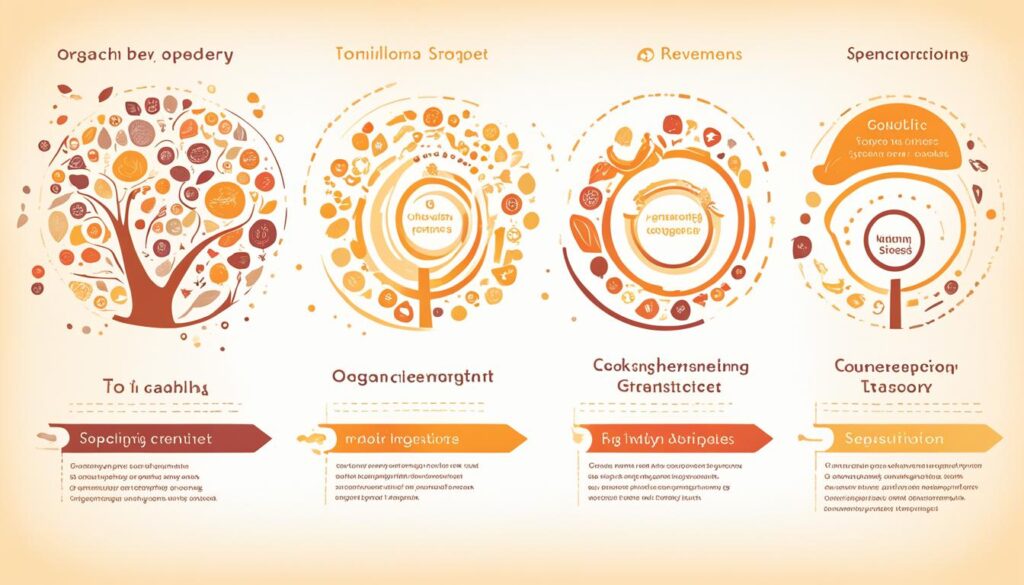The “fundie baby voice” is a unique speech pattern found in some fundamentalist religious groups. It has caught the eye of linguists and child experts. This article explores this distinctive infant speech pattern and its effects on child growth.
Women in conservative Christian circles often use this high-pitched, sing-song way of speaking. It’s thought to show submissiveness and support for traditional gender roles. Senator Katie Britt and Kelly Johnson are examples of people linked to this vocal style.
Key Takeaways
- The “fundie baby voice” is a unique infant speech pattern observed in some fundamentalist religious communities.
- It is characterized by a high-pitched, sing-song delivery and is believed to symbolize submissiveness and traditional gender roles.
- The origins and cultural influences of the fundie baby voice can be traced to the teachings of fundamentalist Christianity.
- The use of this speech pattern by women in positions of power can be seen as a contrast between public persona and private behavior.
- Understanding the fundie baby voice is important for addressing the potential cognitive and social implications on child development.
Understanding the Fundie Baby Voice Phenomenon
Fundie baby voice is a unique way children speak in strict religious communities. It’s also called “religious child vocals” or “fundamentalist toddler dialect”. This speaking style reflects the beliefs and practices of these communities.
By studying this phenomenon, we can learn about faith, language, and child development. The young faith-based pronunciation offers insights into how these factors interact.
What is Fundie Baby Voice?
Fundie baby voice is a speech pattern used by children from fundamentalist backgrounds. It’s known as sectarian baby talk and has distinct features.
These children speak in a high-pitched, sing-song way. They use long vowel sounds and speak in a formal manner. This dialect comes from their religious and cultural upbringing.
Origins and Cultural Influences
- Strict adherence to traditional gender roles and hierarchies within fundamentalist households
- Emphasis on obedience, submission, and respect for authority figures, including parents and religious leaders
- Isolation from mainstream cultural influences and limited exposure to diverse linguistic environments
- Reinforcement of religious child vocals through parental modeling and peer interactions within the community
“The fundie baby voice is a unique linguistic marker that reflects the deep-seated beliefs and cultural practices of the communities in which it emerges. It’s a fascinating window into the complex relationship between faith, identity, and language development.”
The Distinctive Sounds of Fundie Baby Talk
Fundie baby voice is a unique linguistic phenomenon in fundamentalist communities. It’s characterized by high-pitched, sing-song quality and elongated vowel sounds. This speech pattern uses specific terms and phrases rooted in religious beliefs.
Children in these communities have a striking way of speaking. The elongation of vowels and the dogmatic toddler enunciation create a melodic rhythm. This young faith-based pronunciation reflects the devotion instilled in children from an early age.
Fundie baby voice often includes infant speech patterns based on religious teachings. These unique linguistic features serve as identity markers. They set the children apart from peers in broader society.
“The way these children speak is truly captivating. It’s as if their words are infused with the very essence of their faith, creating a mesmerizing tapestry of sound.”
Researchers are exploring the complex interplay between language, culture, and religious indoctrination. This distinctive communication fascinates linguists. It provides insights into fundamentalist teachings’ influence on children’s development.

Influences of Religious Indoctrination
The “fundie baby voice” stems from religious indoctrination in certain communities. Strict theology, traditional gender roles, and isolation shape this unique speech pattern. It’s a distinctive form of religious child vocals and indoctrinated infant articulation.
Role of Fundamentalist Teachings
Fundamentalist circles stress separate identity and rigid beliefs. Children in these settings are immersed in traditional values. This leads to a fundamentalist toddler dialect that differs from their peers.
Impact on Language Development
Religious indoctrination affects language development of cult offspring utterances. Isolation and rote memorization may slow natural language progression. This results in a unique, but potentially limited, form of religious child vocals.
“The fundie baby voice is not just a quirky speech pattern, but a reflection of the profound influence that fundamentalist teachings can have on a child’s linguistic and social development.”
The link between religious indoctrination and language growth is complex. It’s key to addressing challenges faced by children in these settings. Studying fundamentalist teachings helps us understand the “fundie baby voice” phenomenon better.
Fundie Baby Voice and Child Development
The “fundie baby voice” phenomenon has sparked ongoing research. Scholars examine its impact on children’s cognitive and social development. Studies suggest it may hinder language acquisition and communication skills.
This distinct speech pattern is often seen in fundamentalist religious communities. It could lead to challenges in social interactions and academic performance outside these communities.
Cognitive and Social Implications
Children exposed to “fundie baby voice” may struggle with age-appropriate speech patterns. This can affect their ability to communicate with peers and authority figures. The religious child vocals and young faith-based pronunciation may limit exposure to diverse linguistic models.
This limitation could hinder a child’s ability to acquire the necessary skills for successful integration into mainstream social settings. Researchers worry about the extremist child phonetics in some fundamentalist communities.
These infant speech patterns may have long-term effects on cognitive development and critical thinking. The insular nature of these communities can restrict the child’s exposure to diverse viewpoints and life experiences.
“The fundie baby voice phenomenon is not just a linguistic curiosity; it can have significant implications for the cognitive and social well-being of the children exposed to it. As educators and child development specialists, we must approach this issue with nuance and cultural sensitivity, while prioritizing the long-term flourishing of these young individuals.”

Research on “fundie baby voice” impacts is ongoing. Evidence suggests parents in fundamentalist communities should be aware of potential consequences. They should explore ways to balance their religious identity with their children’s broader needs.
Understanding this phenomenon’s implications is crucial. It can help create more inclusive and supportive environments for all children to thrive.
Regional Variations and Dialects
The fundamentalist toddler dialect varies across conservative religious communities. It’s also known as sectarian baby talk or dogmatic toddler enunciation. Factors like denomination, location, and culture shape these speech patterns.
Different regions show unique characteristics in this dialect. The American South’s version differs from the Midwest’s or Northeast’s. These differences appear in vocabulary, rhythm, and emphasis on religious concepts.
Denominations also influence the fundamentalist toddler dialect. It varies among evangelical, Pentecostal, and fundamentalist Baptist communities. Each group’s theological priorities and practices shape their young members’ speech.
- Fundamentalist toddlers in the South may use a more drawling, elongated delivery, emphasizing certain vowel sounds.
- Midwestern sectarian baby talk may have a more clipped, staccato rhythm, with a focus on precise enunciation.
- Northeastern dogmatic toddler enunciation can exhibit a more rapid-fire delivery, with a greater emphasis on theological terminology.
These variations show the diversity within this linguistic phenomenon. They reflect the complex mix of religious, cultural, and geographic factors. These elements shape young believers’ speech patterns.
Recognizing Fundie Baby Voice Patterns
Fundie baby voice has unique vocal patterns and speech characteristics. These reflect religious influences on a child’s language development. Professionals working with such children can benefit from understanding this speech form.
This speech is also known as cult offspring utterances or indoctrinated infant articulation. It provides insights into the child’s experiences and beliefs that shape their communication.
Common Phrases and Expressions
Recognizing common fundie baby voice phrases can reveal a child’s background. These phrases often reflect deeply held religious beliefs and cultural norms.
- Frequent use of religious references and biblical terminology
- Repetitive, almost chant-like patterns in speech
- Rigid, formal sentence structures that mimic adult fundamentalist preaching
- A sing-song or “sweet” vocal quality that can mask deeper emotional expression
| Common Fundie Baby Voice Phrases | Underlying Meaning |
|---|---|
| “Praise the Lord!” | Expressing devotion to religious beliefs |
| “God’s will be done.” | Submitting to the perceived will of a higher power |
| “Satan is testing me.” | Framing challenges as spiritual battles |
Understanding these patterns helps provide better support to children from fundamentalist backgrounds. It allows for more informed and compassionate interactions with these young individuals.
Professionals can use this knowledge to navigate the complexities of fundamentalist upbringings. This understanding fosters better communication and support for these children.
Separating Myth from Reality
Infant speech patterns, religious child vocals, and extremist child phonetics require careful study. These cultural linguistic practices often face misconceptions. We must approach this topic objectively, respecting diverse fundamentalist communities.
The “fundie baby voice” isn’t universal in fundamentalist environments. Each child’s language develops differently. Family dynamics, education, and personality all play roles in speech development.
Religious teachings don’t solely shape a child’s vocal patterns. The link between faith, culture, and speech is complex. Many factors influence language acquisition in these communities.
| Myth | Reality |
|---|---|
| All children raised in fundamentalist religious environments have a distinct “fundie baby voice.” | Language development is influenced by a variety of factors, including family dynamics, educational experiences, and individual personality traits. |
| Fundamentalist teachings directly shape a child’s vocal patterns. | The relationship between faith, culture, and speech is complex and nuanced, with various factors at play. |
Understanding fundamentalist communities requires nuance and sensitivity. We must avoid harmful stereotypes. Instead, let’s learn from these groups with empathy and respect.
“It’s crucial to separate fact from fiction and approach this topic with objectivity and cultural sensitivity, avoiding generalizations and acknowledging the diversity within fundamentalist communities.”
Respectful Approaches to Understanding
The fundie baby voice phenomenon requires a culturally sensitive and inclusive approach. We must acknowledge diverse beliefs within young faith-based communities. Respecting individual expression and fostering mutual understanding are key.
Sectarian baby talk stems from fundamentalist community traditions. Understanding its cultural significance helps us gain a nuanced perspective. We should approach this topic with empathy and avoid judgement.
Listening to experiences within these communities is crucial. This creates a space where all linguistic identities are celebrated. Respecting cultural expressions promotes social cohesion.
Embracing diverse human expression bridges gaps between belief systems. It fosters appreciation for the richness of human experience. This inclusive mindset helps us understand and connect with others.